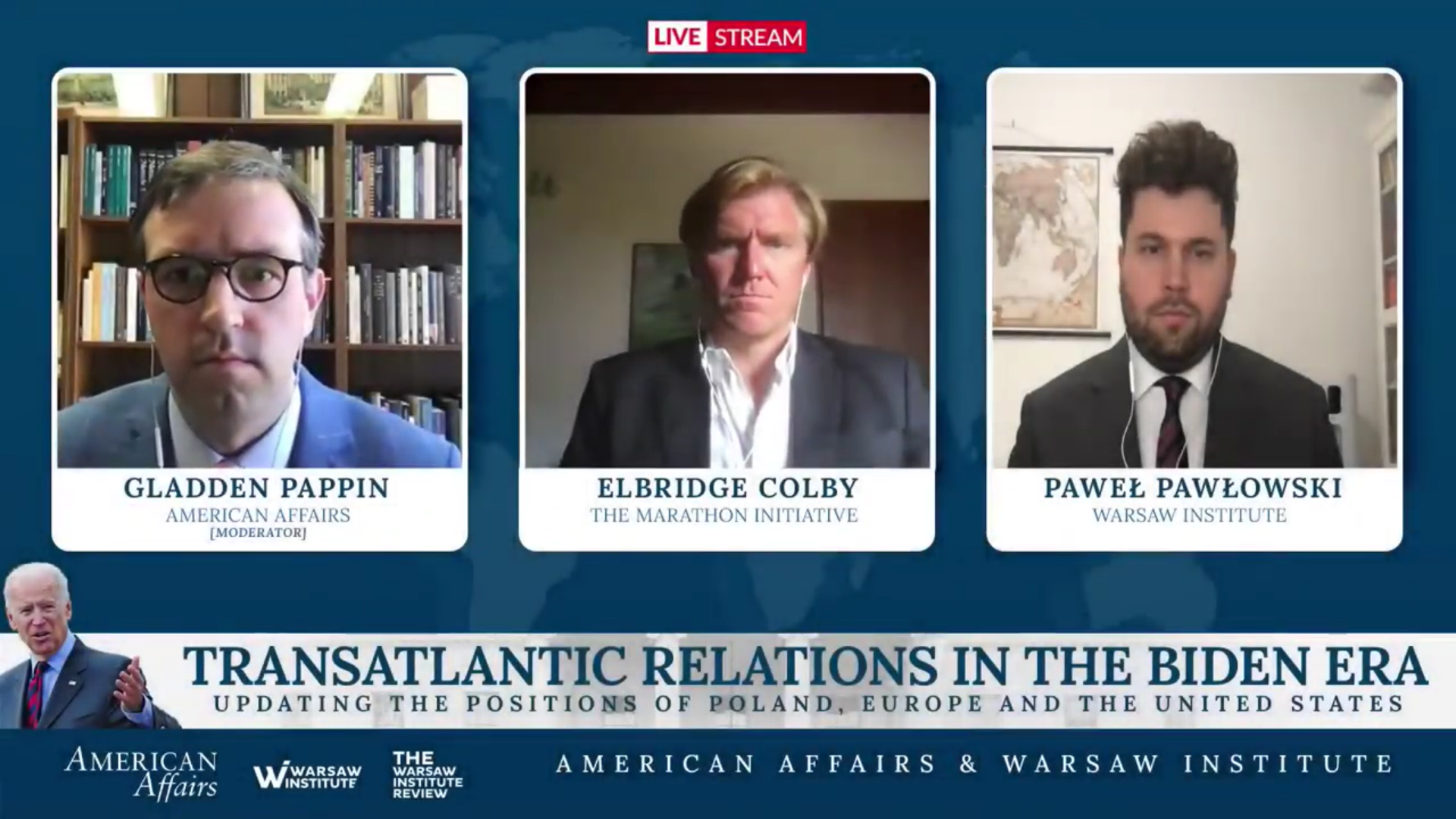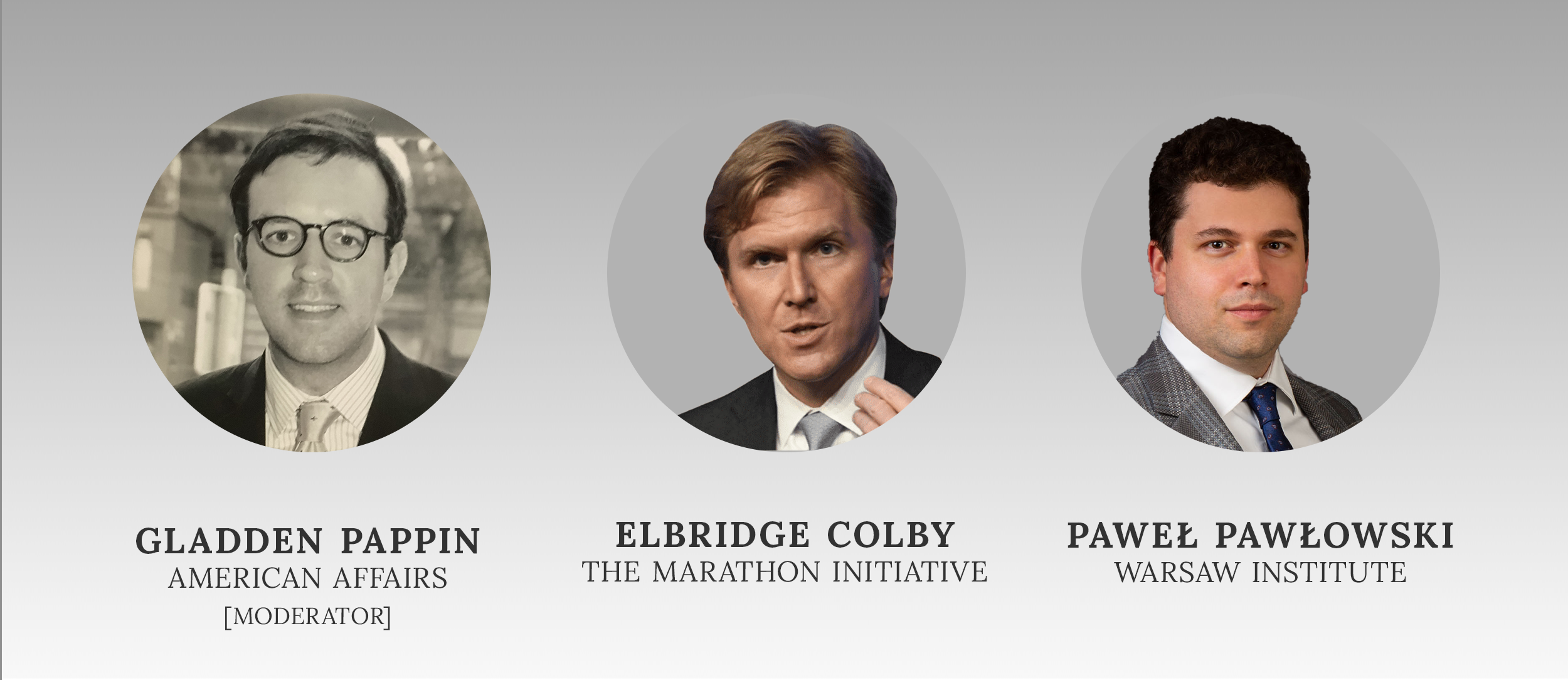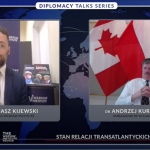EVENTS
Date: 3 March 2021
Event Summary: Transatlantic Relations in the Biden Era
On 2 March 2021, Warsaw Institute think-tank had the honour to co-host an online event with the American Affairs Journal. The moderated discussion “Transatlantic Relations in the Biden Era” focussed on updating the stance of Poland, Europe, and the United States on their prospects for political and economic cooperation. Moderated by Dr Gladden Pappin of the American Affairs, the debate was joined by Elbridge Colby, a co-founder of the Marathon Initiative with abundant experience in the American defense sector, and by Paweł Pawłowski, Chairman of the Warsaw Institute Foundation Council.

Summary:
- United States should maintain strong relationships not just with European Union as a whole but also with its member countries independently.
- China will determine the nature of transatlantic relations.
- Russian influence is visible in the CEE and now also China is trying to exploit divisions within Europe.
- Europe-China relations might be economically beneficial in the short-term but in the long-term could disrupt regional stability and the transatlantic ties.
- The virtue of democracy alone is rather unlikely to unite different countries to a sufficient degree to sustain favourable regional balance and transatlantic cooperation must be based on firm political grounds.
- US foreign policy should be based on the geopolitical context, which the Biden administration seems well aware of.
Transatlantic discussions often leave out the role of individual nation states in European and Global Affairs. The approach motivating the discussion was a different one. From the standpoint of domestic affairs the issues facing European countries and the United States are increasingly similar and in some cases even the same – from the response to the coronavirus pandemic to the issues motivating populism and the regulation of big tech. From a geopolitical standpoint, which was the topic of the event, the preceding presidency in the United States marked a partial shift toward considering issues important to Central and Eastern Europe particularly with president Trump’s visit to Warsaw in 2017.
THE RISE OF CHINA
Mr Colby expressed his view that the rise of China will determine the nature of the relations, and that Biden administration can be anticipated to look at Brussels and, to some extent, Berlin as the leading European powers to align and treat Europe as a coherent whole. He added that the Asian giant is an overwhelming challenge which must be a respectively huge priority, with the eastern continent and China contributing over 50% and 20% of global GDP in the next decades, while Europe will produce ~25% of the world’s output. The expert analysed two scenarios, one with Europe maintaining its relatively stable common policy, the other pursuing the path envisioned by president Macron with unity playing a decreasingly important role. In the latter, he suggested that the US would look for alliances among already cooperating states, with Poland likely to remain a strong partner. Mr Colby said that the most likely scenario is in between those two and that the ball is in Europe’s hands. He concluded that the Biden administration, and especially president Biden himself, deeply believe in transatlantic relationships and particularly the alignment among democracies – something the panellist called a global approach to alliance management.
Following that, Mr Pawłowski emphasized the importance of transatlantic relations in the historical context. He added that, nowadays, Europe is often seen as a “second theatre” – something many former superpowers will need to come to terms with. Poland, however, is not one of those countries and is therefore eager to further strengthen the transatlantic cooperation, especially in terms of security in the CEE. The panellist stressed that with Russian influence visibly present in the region, now also China is trying to exploit divisions within Europe. The settlement regarding economic cooperation between the old continent and the Asian superpower might suddenly transfer Europe to a Chinese digital ecosystem, from where economic and business relations with the US will no longer be possible.

BIDEN’S FOREIGN POLICY
Mr Colby said that, in general, the new administration seems well aware of the geopolitical context and how it applies to their policymaking. He added that despite the presence of keen liberals within the Democratic Party, there are none among the appointees. Therefore, Biden administration will most likely present a pragmatic and assertive liberal approach revolving around the idea of democracy. Mr Pawłowski, on the other hand, addressed the issue of Chinese soft influence within Europe, which successfully presents itself as a thriving economy with full social and public liberties to its citizens. Many people forget about the dark side of the authoritarian system employed by the Asian giant, and in considering how well the country is functioning despite the pandemic forget about those people who are in Chinese concentration camps. The expert emphasized the need to underline our perception of democracy and juxtapose it with the entirety of the PRC’s one-party system, not just its seeming advantages.
US-EU DYNAMICS
Mr Pawłowski highlighted the close ties that have always been present among the countries despite some turbulences in the history. He praised Germany for supporting Poland on its way towards joining NATO and the European Union. On the other hand, a remark was made about the changing balance of power within the EU visible in Berlin overtaking Brussels as the executive heart of the alliance. He concluded that in this, Germany might see the opportunity to regain its status as a global superpower through increased cooperation with China. Mr Pawlowski said that the short-term economic gains must not overtake the need for long-term stability and security of the entire region. In response to that Mr Colby reminded that the main force driving American foreign policy must be the geopolitical context rather than an ideological agenda of any type. Likewise the virtue of democracy alone is rather unlikely to unite different countries to a sufficient degree to sustain favourable regional balance. As an example he referred to Germany, whose liberal political rhetoric does not translate to respectively progressive actions, and who chose to align more with China rather than the United States. Mr Colby said that in these circumstances America needs to work with Poland, yet the relation should not be based solely on values. He added that the transatlantic relations between the US and Poland are founded on very firm grounds politically, because the superpower which America undoubtedly is will always need a natural alignment with a “second-tier” powers. Securing strong relations with such countries not only through Brussels, but also independently is essential to ensure the stability of transatlantic cooperation.
Q&A
As always, questions were asked from the audience. The panellists were asked to speak about Brexit and its effect on internal dynamics within the EU, and whether it makes deeper union plausible or presages for the departure of other states, and what it means for the US. Mr Colby presented a perspective that, paradoxically, more exits may actually cause more cohesion by forcing a choice on some countries. From the case of continental Europe, Brexit has of coursed caused political stress. Nevertheless, it has also caused large firms to choose to move out from London to other capitals in the region.
Another question enquired about the degree to which the Biden administration will maintain or strengthen a global perception of the United States as a mediator, especially with regard to Russia, Iran, or China. Mr Colby noted that as of now there is no such ambition from the White House, whose primary ambition is to strengthen global democracy. Mr Pawłowski added that the recent events in Syria suggest the US is shaping its image as actively engaged against hostile nations, and that while not rejecting the chances for mediation, it will not be at the core of US foreign policy.
PANELISTS

Elbridge Colby
Mr. Colby is a co-founder and principal of The Marathon Initiative, a policy research think tank focused on developing strategies to prepare the United States for an era of sustained great power competition.
Previously, Colby was from 2018-2019 the Director of the Defense Program at the Center for a New American Security, where he led the Center’s work on defense issues.
Before that, he served as the Deputy Assistant Secretary of Defense for Strategy and Force Development from 2017-2018. He also served as the primary Defense Department representative in the development of the 2017 National Security Strategy.
Paweł Pawłowski
Mr. Pawłowski is a Chairman of the Foundation Council at the Warsaw Institute, a geopolitical think tank based in Poland. He is also Vice-President of the Board in the Cegielski Center for Analysis. Graduate of the Faculty of Law and Administration, University of Warsaw and Babson Entrepreneurship Program at Babson College. He was an intern as research assistant at the Institute of World Politics in Washington, DC. He gained his professional experience in the best banks in Poland. Currently he works as a manager in the leading company in the regional transportation sector.
Gladden Pappin
Dr. Pappin is the cofounder and deputy editor of American Affairs. He is assistant professor of politics at the University of Dallas and a senior adviser the University of Notre Dame’s de Nicola Center for Ethics and Culture. He received his BA (history) and PhD (government) from Harvard.
All texts published by the Warsaw Institute Foundation may be disseminated on the condition that their origin is credited. Images may not be used without permission.

















